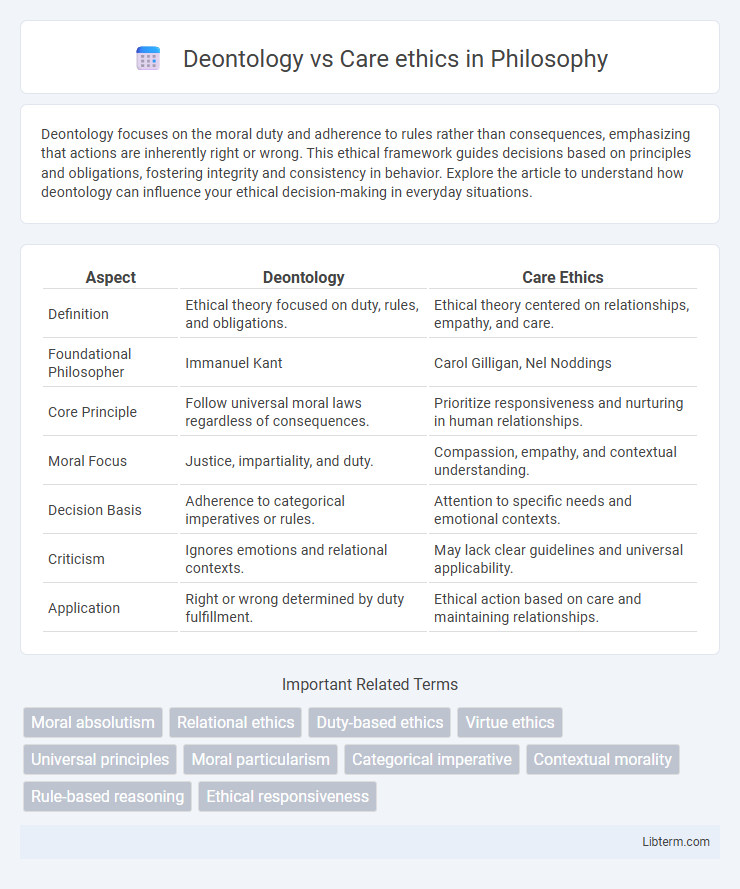Deontology focuses on the moral duty and adherence to rules rather than consequences, emphasizing that actions are inherently right or wrong. This ethical framework guides decisions based on principles and obligations, fostering integrity and consistency in behavior. Explore the article to understand how deontology can influence your ethical decision-making in everyday situations.
Table of Comparison
| Aspect | Deontology | Care Ethics |
|---|---|---|
| Definition | Ethical theory focused on duty, rules, and obligations. | Ethical theory centered on relationships, empathy, and care. |
| Foundational Philosopher | Immanuel Kant | Carol Gilligan, Nel Noddings |
| Core Principle | Follow universal moral laws regardless of consequences. | Prioritize responsiveness and nurturing in human relationships. |
| Moral Focus | Justice, impartiality, and duty. | Compassion, empathy, and contextual understanding. |
| Decision Basis | Adherence to categorical imperatives or rules. | Attention to specific needs and emotional contexts. |
| Criticism | Ignores emotions and relational contexts. | May lack clear guidelines and universal applicability. |
| Application | Right or wrong determined by duty fulfillment. | Ethical action based on care and maintaining relationships. |
Introduction to Deontology and Care Ethics
Deontology is an ethical theory centered on adherence to moral duties and rules regardless of outcomes, primarily associated with philosopher Immanuel Kant. Care ethics emphasizes the importance of interpersonal relationships and the moral significance of empathy, compassion, and care in ethical decision-making. Both frameworks provide distinct approaches to moral reasoning, contrasting rule-based obligations with relational and context-sensitive considerations.
Historical Origins and Key Philosophers
Deontology, rooted in Immanuel Kant's 18th-century philosophy, emphasizes duty and universal moral laws, asserting actions are intrinsically right or wrong regardless of consequences. Care ethics emerged in the late 20th century, pioneered by feminist philosopher Carol Gilligan, focusing on relational interdependence and the ethics of care as opposed to abstract principles. Kant's categorical imperative contrasts with Gilligan's emphasis on context and emotional engagement in moral reasoning.
Core Principles of Deontology
Deontology centers on the core principle of duty-based ethics, asserting that actions are morally right if they adhere to established rules and obligations regardless of outcomes. Its foundation lies in Kantian ethics, emphasizing universal maxims, respect for persons as ends in themselves, and the categorical imperative. Unlike care ethics, which prioritizes relational context and emotional responsiveness, deontology upholds impartiality and principled consistency as essential for ethical decision-making.
Fundamental Tenets of Care Ethics
Care ethics centers on the fundamental tenet of relational interdependence, emphasizing empathy, compassion, and the moral significance of nurturing relationships. Unlike deontology's focus on universal duties and rules, care ethics prioritizes contextual understanding and responsiveness to the needs of others, particularly within close, personal bonds. This ethical framework values emotional engagement and the maintenance of social connections as essential to moral decision-making.
Moral Reasoning: Rules vs. Relationships
Deontology emphasizes moral reasoning guided by universal rules and duties, prioritizing adherence to ethical principles regardless of circumstances. Care ethics centers moral reasoning on relationships and context, valuing empathy and responsiveness to the needs of others over abstract rules. This contrast highlights deontology's focus on impartial obligations versus care ethics' emphasis on relational interconnectedness and emotional engagement.
Applications in Real-World Ethical Dilemmas
Deontology applies strict adherence to moral rules and duties, emphasizing actions that align with universal principles in real-world dilemmas such as legal judgments and professional codes of conduct. Care ethics prioritizes relationships and empathy, guiding decision-making processes in contexts like healthcare and family dynamics where emotional response and situational nuances are critical. Both frameworks influence ethical practices by balancing rule-based obligations with the need for compassion and interpersonal understanding.
Strengths and Criticisms of Deontology
Deontology's strength lies in its clear, rule-based framework that emphasizes duty and moral principles, fostering consistency and impartiality in ethical decision-making. Critics argue it can be overly rigid, neglecting context and emotional factors that influence human behavior. This approach often struggles with conflicting duties, where strict adherence to rules may lead to morally questionable outcomes without flexibility or consideration of consequences.
Strengths and Criticisms of Care Ethics
Care ethics emphasizes the moral importance of relationships, empathy, and context, challenging abstract universal principles by prioritizing emotional responsiveness and interconnectedness. Its strengths lie in fostering compassionate decision-making and recognizing the complexity of human experiences, yet critics argue it may lack clear, consistent guidelines and risk partiality or neglect of justice principles. Care ethics offers a valuable alternative perspective but requires balancing empathy with ethical rigor to address potential biases.
Comparative Analysis: Deontology vs. Care Ethics
Deontology emphasizes universal moral duties and adherence to rules, prioritizing principles such as justice and fairness, while Care Ethics centers on relational contexts and the importance of empathy, compassion, and maintaining interpersonal connections. Deontological frameworks often demand impartiality and consistent application of ethical rules, whereas Care Ethics highlights the moral significance of particular relationships and situational responsiveness. These contrasting approaches reveal Deontology's focus on abstract rights and duties compared to Care Ethics' emphasis on emotional engagement and ethical responsibility grounded in care.
Conclusion: Integrating Perspectives for Ethical Decision-Making
Integrating deontology and care ethics enhances ethical decision-making by combining duty-based principles with relational empathy, ensuring actions respect universal moral laws and individual contexts. This synthesis supports balanced judgments that honor both justice and compassion, promoting ethical outcomes responsive to diverse situations. Applying both frameworks fosters holistic moral reasoning essential for complex real-world dilemmas.
Deontology Infographic

 libterm.com
libterm.com